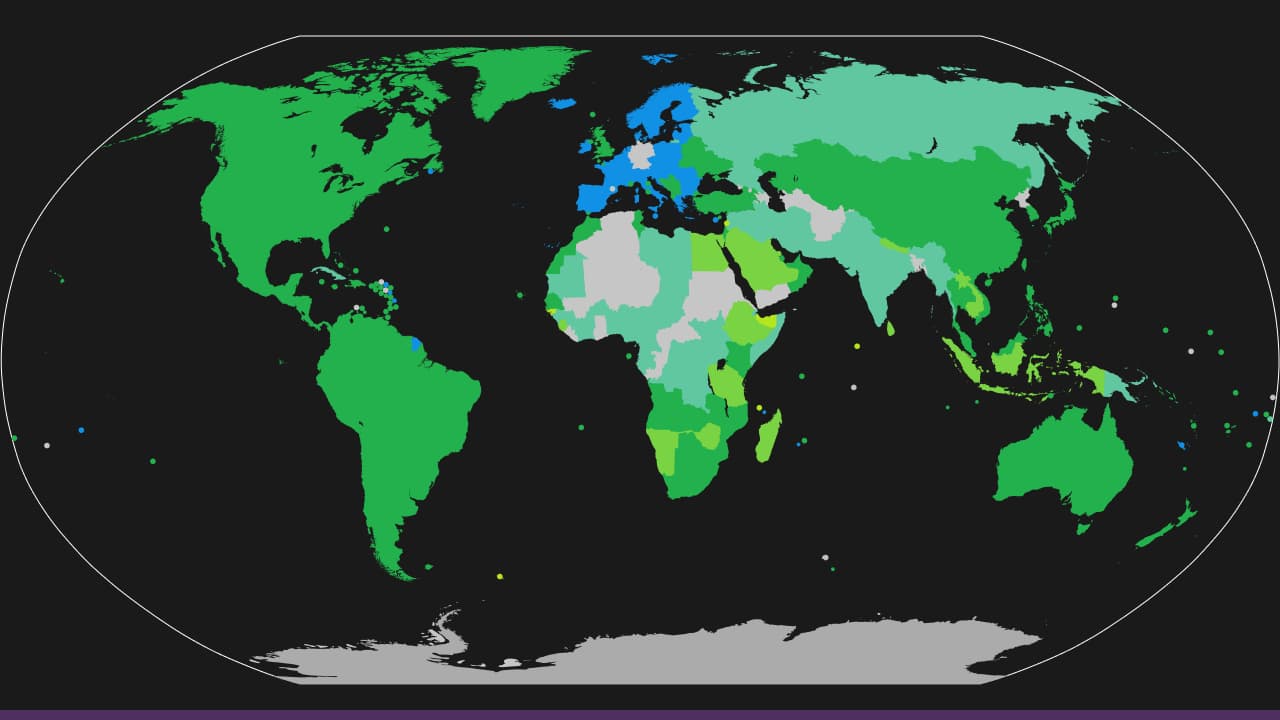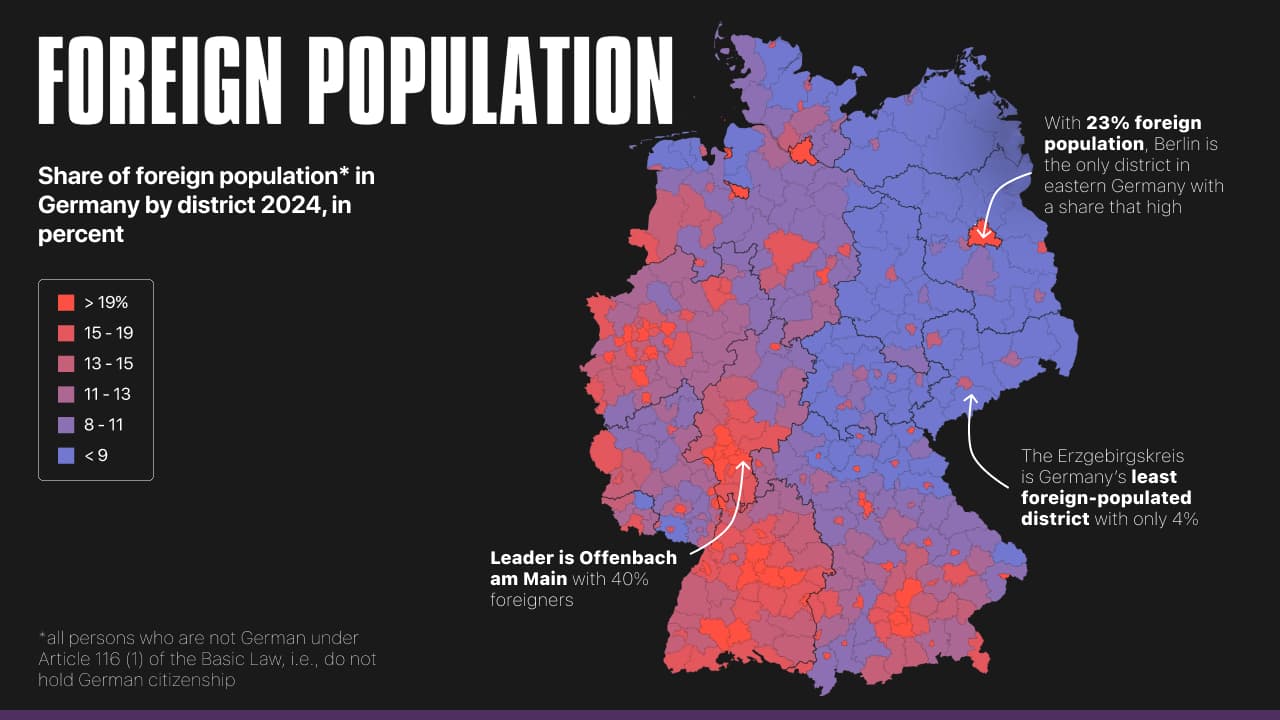11 Jul 2025
11 MIN READ
Why Do People Want German Citizenship?
Summary
Germany is one of the most desirable countries to move to, primarily due to its role as the economic powerhouse in Europe and the numerous job opportunities available. It also boasts some of the world's best academic institutions. Additionally, many people want to move to Germany for the chance to obtain German citizenship in the future, as it offers them unrestricted freedom of movement and significant economic and social benefits.

German passport, national flag, and constitution booklet representing the German immigration and citizenship process. Credits: Corral International Law
What is German Citizenship?
German citizenship gives a person full rights and responsibilities as a national of Germany. It provides access to civil liberties, political participation, and legal protections in Germany and the European Union (EU).
Benefits of German Citizenship
The German passport is one of the most valuable passports in the world. As of 2024, the German passport is ranked the third-best passport globally in terms of travel freedom. Holding a German citizenship has several benefits:
-
Unrestricted access to the European Union. Granting a German citizen the right to live, work, and study in 27 countries without needing a residence permit. They can also live in Iceland, Norway, Switzerland, and Liechtenstein, which are not part of the EU but part of the Schengen Area’s free movement scheme.
-
It grants access to 189 countries visa-free or with a visa-on-arrival. It includes major destinations like the USA, Canada, Japan, Australia, and most of South America and Asia.
-
German passport holders don’t even need to use their passports to travel around the European Union. They only need a national ID to travel around the EU and EEA. Some countries, such as Turkey, also permit Germans to enter with a German identification card.
-
Opportunity to participate in the political process. As a German citizen, one can vote in German elections and have a direct say in the country's affairs. They can also run for a political office in Germany.
-
Germany has a strong social safety net. It has an excellent healthcare system and a range of social services for its citizens.
-
German citizens have unrestricted access to the German and EU labor markets.
-
Educational opportunities that offer tuition-free education at public universities and provide financial aid (BAföG) based on need.
-
It allows opportunities for citizens to set up and run a business in Germany and other EU countries.
-
Citizenship also provides a sense of security. While permanent residency offers many of the same benefits, it can still be revoked under specific conditions, unlike citizenship, which is far more stable.
-
There are a large number of German consulates and embassies worldwide, providing German citizens abroad with options for consular protection if needed.

Countries with visa-free, visa-on-arrival, or e-visa access for German passport holders in 2025. Credits: Wikimedia Commons
Who Are the People Wanting German Citizenship?
Usually, people might want to obtain German citizenship because they have a German grandparent and wish to reside in the EU. There are also many immigrants from the Balkans and others who have lived there and want to be a part of the political process. Refugees wish to obtain citizenship because a German passport is considered more valuable than a Syrian or Afghan passport. For many, German citizenship represents an opportunity for a better quality of life, security, and access to broader global opportunities.
Immigration in Germany
Germany has approximately 21.2 million people with a migration background, which accounts for one in four residents. Since 2015, migration has increased, with many coming from Syria, Ukraine, Turkey, Romania, and other countries. By 2024, net migration reached over 660,000, mainly due to asylum seekers, skilled workers, and students. Almost one-third of Germans under 30 have an immigrant background of some sort.
But the path to integration has its ups and downs. While many seek to immigrate to Germany, the honeymoon phase can end quickly. Surveys indicate that a substantial proportion of migrants reassess their long-term plans after settling in Germany due to bureaucratic hurdles or integration challenges.
Many foreigners face challenging issues, including bureaucratic red tape, discrimination, and unrecognized qualifications. Despite these obstacles, immigration is a lifeline for Germany's economic vitality. To keep our workforce flourishing, the nation seeks over 400,000 newcomers each year.
Historical trends in German migration
After World War II, around 12 million ethnic Germans were expelled from Eastern Europe and resettled in Germany. In the 1950s and 1970s, West Germany invited millions of "guest workers" (primarily from Turkey, Italy, and Yugoslavia) to help rebuild its economy. Although they were meant to stay temporarily, many settled permanently.
In the 1980s and 1990s, migration shifted to family reunification and the arrival of ethnic Germans from the former Soviet Union. The Balkan Wars and unrest in Eastern Europe also brought a wave of asylum seekers, leading to tighter immigration laws in 1993.
From the 2000s onward, Germany experienced steady migration due to EU expansion. This was especially true for people from Poland, Romania, and Bulgaria. In 2015 and 2016, over 1 million refugees, mainly from Syria, arrived during the refugee crisis.
Today, Germany is a leading destination for skilled workers and refugees. Migration remains vital to its economy and demographics.
Germany’s Efforts to Attract Skilled Workers – Skilled Immigration Act Reform

Italian guest workers at Wolfsburg train station, returning to Germany after the Christmas vacation in 1972, during the era of labor migration. Credits: IMAGO / Rust
The German government introduced the new Skilled Immigration Act (FEG) to facilitate the immigration of skilled workers with vocational training and individuals with practical knowledge to Germany. Key changes in the act included easing entry requirements for skilled professionals, expanding the EU Blue Card system, and introducing an “Opportunity Card” for individuals seeking jobs in the country. This initiative was introduced to address the growing shortage of skilled labor in Germany.
How to Get German Citizenship
There are several ways to obtain German citizenship. The most common way is naturalization, as citizenship by descent is limited.
Naturalization
To obtain German citizenship through naturalization, individuals need to be legally residing in the country for at least five years, possess German language skills (B1 level), be financially self-sufficient, and not hold any criminal record. They must also have a good understanding of German laws and cultural systems.
However, as of 2024, the German government introduced accelerated (turbo clause) naturalization, where individuals can be naturalized in three years, in some instances. Individuals need to demonstrate exceptional integration, such as proficiency in German at the C1 level, strong professional or volunteer achievements, or be spouses of German citizens (with a marriage of at least two years).
Refugees can apply after five years of habitual residence, provided they can demonstrate that they have been fully integrated into German society. The rules for this are more complicated than for other immigrants. Their cases can vary as well with naturalization. Here is a more comprehensive list of the requirements here.
By descent
Typically, if one has a German parent, they are usually eligible for citizenship. It becomes a bit more difficult if someone applies when they are older, as it needs to be claimed generally before the child reaches adulthood. There are some fast tracks to it if this is not the case.
For people born before 1975, it was necessary for their father to be a German citizen to claim citizenship. If their mother was the parent, they had to fill out a declaration form to be eligible to apply for citizenship.
If their parents renounced their German citizenship to become US or Canadian citizens, it is often not possible.
There are a couple of exceptions to this. If someone's grandparents or parents were German citizens and lost their citizenship (e.g., by fleeing Nazi persecution or due to unjust laws), they may be eligible to reclaim German citizenship.
Children born after 2000 to non-German citizens in Germany may be eligible to obtain German citizenship if one parent has been residing in Germany for more than eight years and holds permanent residence in Germany.

Distribution of foreign populations in 2024, with color variations signifying different levels of foreign residency by district. Credits: Destatis
German Dual Citizenship Rules
Previously, Germany had stringent rules regarding dual citizenship; most candidates were required to renounce their other citizenship to obtain German citizenship. The exceptions were if they had a German parent, were a Jewish descendant of a Holocaust victim, or fell under a special policy that the German government had. However, now, Germany allows dual citizenship.
Germany’s recent changes to its dual citizenship laws
Germany has updated its citizenship laws to simplify the naturalization process. The changes started on June 27, 2024. Now, the required legal residence for naturalization is five years. For those with exceptional integration, it could be as short as three years, down from eight years. The new law also allows people to hold dual citizenship. This means they do not need to give up their previous nationalities when they become citizens.
However, current legislation is being considered that may reverse some of the waiting time, so it is always important to stay informed, as this information can and does change with various German governments. However, the topic of migration remains politically sensitive in Germany, and future policy shifts could impact naturalization timelines or criteria.
Controversies around Germany’s citizenship rules
Germany’s stringent citizenship laws were felt among the Turkish and some Balkan communities in Germany. There were third-generation Turkish citizens born in Germany without citizenship because Germany wanted them to renounce their citizenship.
Some viewed this as unfair in the 1990s, many “ethnic Germans” from former soviet countries had an easy pathway to German citizenship and did not have to renounce. Some believe most of the “ethnic Germans” were not even really Germans; they were just committing fraud to be able to obtain German nationality.

The German parliament building in Berlin with the national flag. Credits: Unsplash - Maheshkumar Painam
Conclusion
Whether German citizenship is ‘worth it’ depends on personal circumstances. For those with ancestral claims or long-term residency, the advantages—including mobility, political rights, and legal stability—are significant. However, for citizens of countries with strong passports and restrictive dual citizenship policies, the decision may require more consideration.
People Also Ask
Why should I get German citizenship?
It can open many doors and enable one to be part of the political process in Germany. Additionally, German citizens hold a strong passport, granting them freedom of movement within the European Union and in many countries visa-free.
Why do people immigrate to Germany?
Many have immigrated to Germany for multiple reasons. Some of them are facing conflicts in their countries, and others have immigrated for better job prospects and a better life.
Is it good to have a German passport?
Yes, the German passport is widely considered to be one of the most advantageous globally.
What are the disadvantages of dual citizenship in Germany?
Generally, there aren’t many disadvantages. The other country in which one holds citizenship may have strict dual citizenship laws and can require someone to renounce their other nationality. Countries like the US might still double-tax a high-earning German citizen abroad.
What is the strongest passport in the world?
According to the Henley Passport Index, considered the most authoritative and thorough on this matter, Singapore has the strongest passport.
